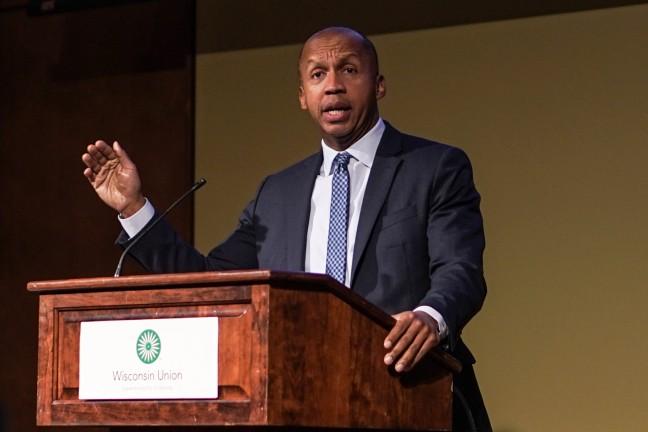University of Wisconsin’s “Go Big Read” author Bryan Stevenson chronicled his experiences working in the justice system to a packed room in Varsity Hall Monday, and explained how changing narratives will lead to tangible change.
Stevenson worked as a lawyer at the Southern Center for Human Rights representing death-row inmates after graduating from Harvard Law School in 1985.
Stevenson said working in such close proximity with his clients who had committed various crimes changed him. Through the relationships he developed with clients, along with the challenges and disadvantages he has faced, he realized he may be a tool for justice.
He encouraged the audience not to distance themselves from places of despair and violence, but instead get closer because in doing so, people will see, hear and learn things about the power proximity can instill.
On the death penalty: "the question is not does someone deserve to die. It's 'do we deserve to kill?'" #BryanStevenson #UWMadison
— Ja'Dell “Openly Black” Davis (@MsJaDell) October 27, 2015
“We cannot change the world with proximity alone. We have to change the narratives that sustain inequality and injustice,” Stevenson said. “We have to change and disrupt the politics of fear and anger. We have to start asking different questions.”
Stevenson attributed part of the the sources of society’s fear and anger to the mass incarceration of black people that was misguided by the war on drugs. In deciding to treat drug dependency as a crime issue rather than one of health, the U.S. has demonized people of color.
Stevenson said the practice of labeling black kids as “super predators,” has led to every state in the country lowering the minimum age for trying children as adults. Because of this, Stevenson said it led to the incarceration of hundreds of thousands of kids in adult prisons.
Today, Stevenson said there are 10,000 kids in adult jails, and when asking who is responsible for this incarceration, Stevenson said the American people. He said the propensity to believe some kids aren’t kids has led the government to neglect black children in the U.S.
“We have to change the narrative about race in this country. We have all been infected by a disease created by our history of racial inequality,” Stevenson said. “We are all burdened by this disease. We have been corrupted by a narrative of racial difference.”
Stevenson said country’s racial narratives is the reason why young men of color are being targeted, shot and killed by law enforcement.
But, Stevenson said it is important to maintain hope in these situations.
“We have to stay hopeful. You have to protect your hope,” Stevenson said. “Hopelessness is the enemy of justice; injustice prevails where hopelessness persists.”
we were so fortunate to have #BryanStevenson speak at @WisconsinLaw this afternoon. what a powerful and inspirational message #JustMercy
— Claudia Bhatt, Esq. (@ClaudiaHarke) October 26, 2015
Stevenson told the audience he doesn’t do his work because of human rights or social injustice. Instead, he works in the justice system because he is broken in the same way his clients are.
Stevenson said he works in a broken system of justice, and his clients are people broken by not only poverty and racism, but the American structures and systems, coupled with the country’s racial narratives.
“The truth is that if you get close, if you get proximate, if you change narratives [and] if you stay hopeful and do uncomfortable things, it will break you,” Stevenson said. “But in brokenness, I am here to tell you there is a kind of power that will save us.”














